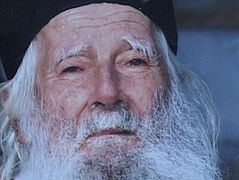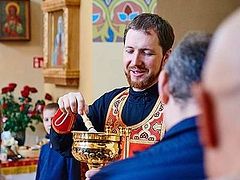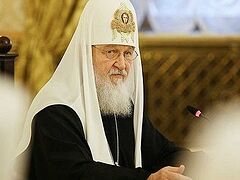Moscow, December 25, 2020
His Holiness Patriarch Kirill of Moscow and All Russia headed the 2020 Moscow Diocesan Assembly yesterday, touching upon, among other things, the presence and role of clerics on social networks. The internet is an important area for pastoral care today, the Patriarch said, though priests must be very careful to maintain their priestly dignity and priorities intact.
The Patriarch recalled that the 2019 Assembly proposed the topic, “The presence of a priest on social networks: positive experiences and dangers,” for consideration at pastoral conferences, adding that the period of quarantine made this topic even more relevant. He also noted that the materials from these conferences were one of his sources for preparing his report for this year’s Assembly, reports Patriarchia.ru.
“Of course, we can’t leave the many people involved in social networks without pastoral care. At the same time, it’s obvious that not every priest can be a social network preacher and that social networks conceal their own special temptations for a priest,” Pat. Kirill said.
A priest engaged in evangelization work online should have a good education and a generally high cultural level, the Patriarch said. And according to the general opinion of the participants of the various pastoral conferences, such priests should first of all be a pastor “with many years of experience in bringing people to Christ.”
And as people turn more and more to electronic devices to fulfill all their needs, one of the tasks of priests today is to help people understand the importance of participating in real parish life, and especially in the holy Eucharist and Divine services, the Patriarch said.
It’s also important to be aware that online communications do not necessarily allow for privacy, especially in matters of confession and spiritual counseling.
Online priests must also remember that their calling is to bring people to Christ, not to themselves, though social networks present the temptation of creating a cult of personality.
Moreover, online activities must not take away from the priest’s participation in the liturgical life and other activities of his parish. If a priest-blogger, for instance, has more followers than parishioners in his parish, there is a real temptation for him to simply become a blogger who talks about the spiritual life and to cease being a real pastor. And more seriously, the celebration of the Divine services and the holy Eucharist could begin to take second place in his life.
Priests must make a sober assessment of their activities, preferably with the advice of more experienced clerics or their bishop. Unfortunately, there have been cases of priests becoming so immersed online that they transform into life coaches or psychologists and decide to give up their priesthood, His Holiness said.
Online priests must also be careful to maintain their priestly dignity, Pat. Kirill emphasized. They must not to stoop to insults or threats or simple attempts just to entertain people.
“A priest, sometimes very young, begins to think that he is an experienced pastor—so many subscribers!—able to answer the many questions that come to him in virtual reality,” His Holiness continued. “Such clerics often lose the ability to accept any criticism, and not only on the internet, or respond to objections with endless arguments. The cure for this disease should be sought in prayer, in the humble acceptance of advice and guidance from fellow men.”
Of course, a priest can have his own point of view on what is happening in the world, but it should be based upon a “thoughtful theological and prayerful assessment.”
“Church ministry should be a matter of proclaiming the Good News of Christ Jesus, of the Kingdom of God come in power (cf. Mark 9:1), and not of personal evaluations or polemics,” Pat. Kirill concluded.
Follow us on Facebook, Twitter, Vkontakte, Telegram, WhatsApp, Parler, MeWe, and Gab!





